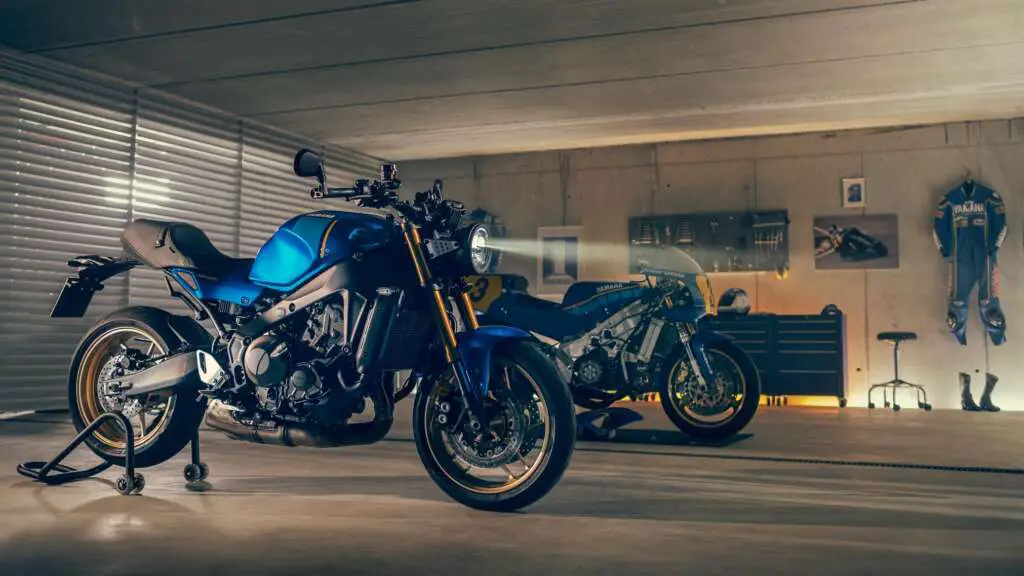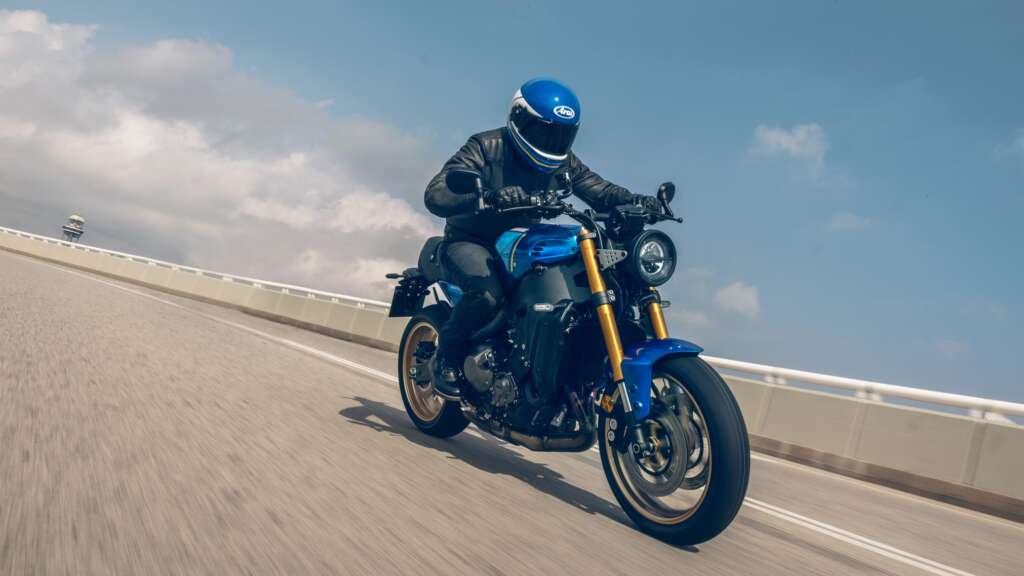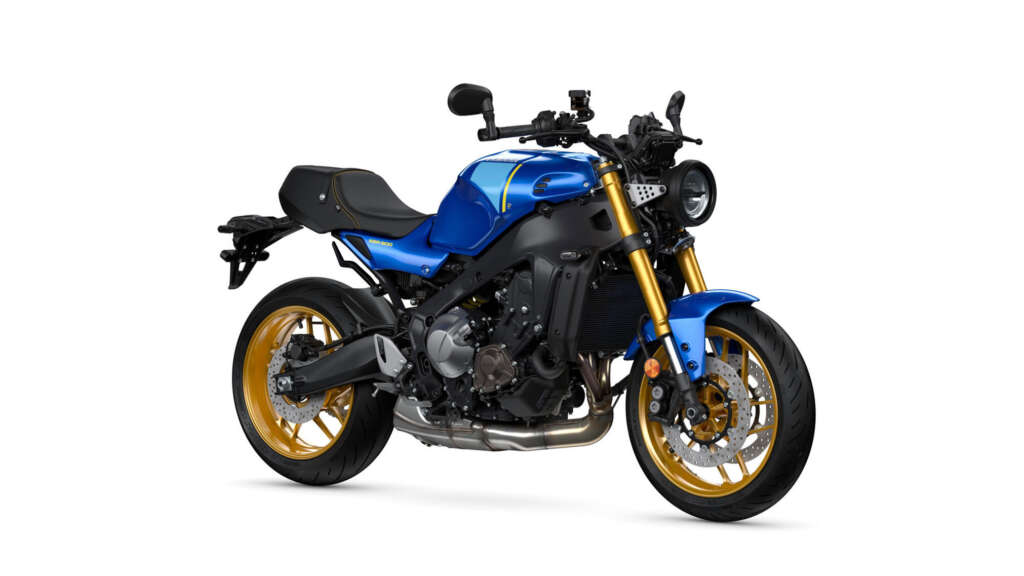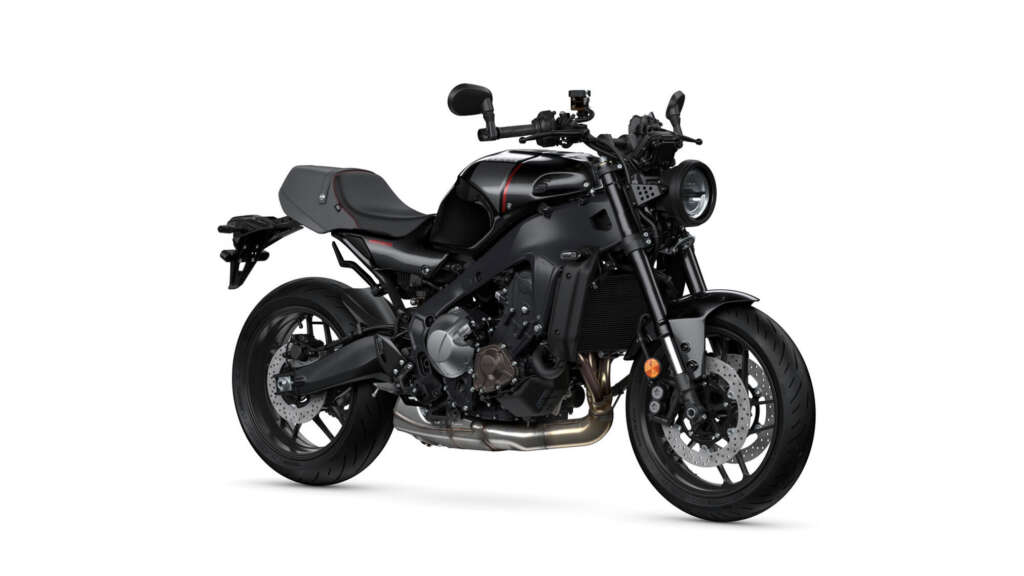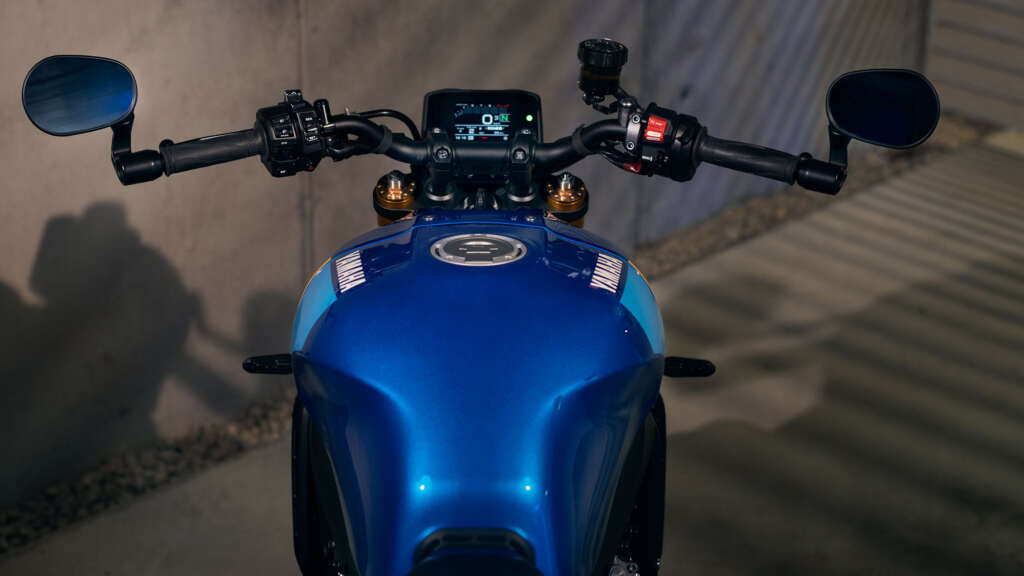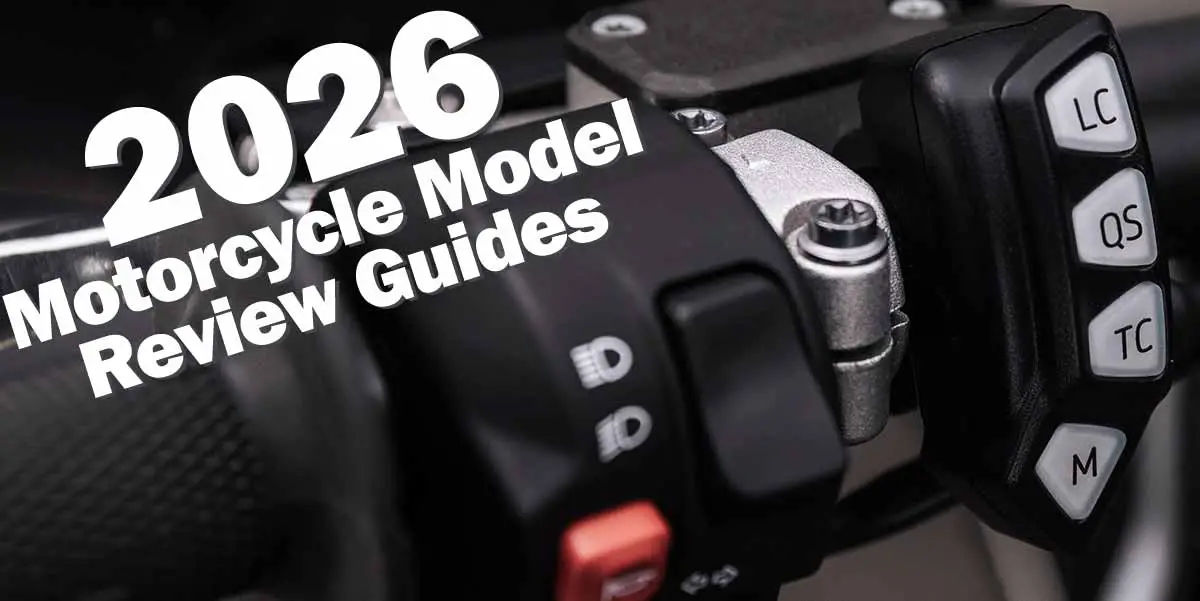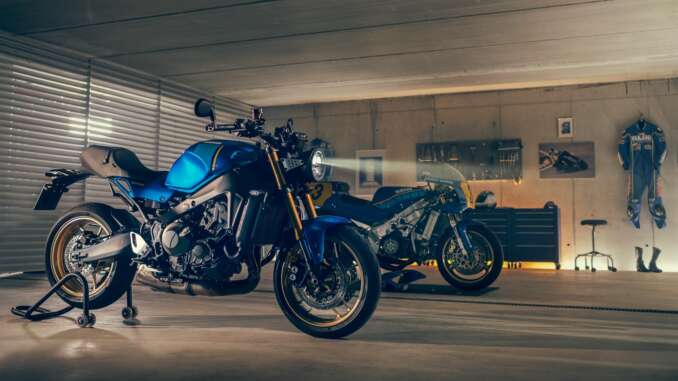
2022 Yamaha XSR900: YAMAHA’S ULTIMATE FASTER SON.
Introducing the new 2022 Yamaha XSR900…
The XSR900 holds its own on all routes, whether it is on those daydreaming twisty roads or the open straight, it feels at home doing both. Equipped with the most modern electronics package that gives every rider the highest level of controllability in any type of situation. And with its sporty Quick Shifter as well as a relaxed Cruise Control, you can go as you please with this 3-cylinder muscle machine.
Yamaha’s XSR Sport Heritage range is like no other. Each model pays tribute to some of the most iconic motorcycles and designs from the company’s rich history, while at the same time offering performance minded riders the very latest in terms of engine and chassis technology.
This special combination in which a genuine respect for the past is seamlessly bonded with high performance and timeless beauty is what drives Yamaha’s Faster Sons philosophy. It resonates with those people that want to experience great riding, but also want to look stunning while doing just that. Offering a select group of informed riders the freedom to underline their individuality, every XSR model is the ideal blank canvas that allows for easy customisation and personalisation.
The freedom and creativity that XSR models offer can be seen in the many unique and beautiful Yard Built projects that have come out of the growing custom scene over the last 7 years. Not only inspiring fellow riders, but also greatly inspiring Yamaha in terms of design.
After the presentation of the first XSR900 in 2016 the Sports Heritage segment has grown and matured, and has established itself as a significant segment in the European market. Now, it is time to re-affirm the XSR900’s position as the ultimate Faster Son – a motorcycle that encapsulates the pioneering Spirit of Yamaha, while offering the very latest in terms of unique design, thrilling riding character and exclusive technology.
Don’t be fooled by the timeless good looks of the XSR900, because underneath that 80s sport bike look there’s some serious high-performance technology. Not only does it come with the smooth EU5 889cc CP3 engine with a ton of torque, but it’s also fitted with a lightweight Deltabox-style chassis with Brembo radial master cylinder, lightweight Spinforged wheels and fully adjustable suspension.
As the emperor of the Sport Heritage range, the XSR900 is the ultimate proof of the Faster Sons philosophy in action. Taking its design inspiration from some of Yamaha’s legendary historic machinery, this high-performance motorcycle is the living proof of decades of intensive research and development.
This is the kind of motorcycle that you can enjoy in almost any kind of situation. It’s easy ergonomics are specially designed to give you an open and adaptable riding position that makes every ride more enjoyable. From narrow twisty backroads through to fast open corners or relaxed cruising through town, the XSR900 is ready for anything.
2022 Yamaha XSR900 Totalmotorcycle.com Key Features
- Historic Yamaha Racing influenced design
- High quality details and premium materials
- Flexible and relaxed riding position
- Signature XSR LED lighting
- Hidden rear LED lighting
- Modern take on historic colouring
- Rider Aids Package, 6-axis IMU
- Traction Control, Slide Control, Brake Control, Lift Control
- Versatile high-torque EU5 889cc CP3 engine
- QSS, Cruise Control and A&S clutch
- Lightweight CF die-cast Deltabox-style chassis
- Lightweight Spinforged wheels
- High specification adjustable suspension
- 298 mm dual front discs with Brembo Master Cylinder
- Forged aluminium foot controls
- XSR900-specific low-profile subframe with foldaway passenger footrests
- Full LED Indicators
- Bar end mirrors
- Machined top triple clamp
- Race-inspired 15 litre fuel tank with race-style filler cap
2022 Yamaha XSR900 Totalmotorcycle.com Features and Benefits
Blending racing heritage with advanced technology
The new generation Deltabox-style frame is a perfect example of how the XSR900 blends Yamaha heritage design with the latest road sports technology like nothing else.
Turn the clock back 40 years to the 1980s and the Deltabox frame was a radical new technology that changed the racing world forever. Already famous for its innovative technology that had established the company as one of the most successful names in road racing, Yamaha was the first manufacturer to move away from the conventional tubular frame and develop what was then a controversial and daring design. With many World Championship wins to its credit, the Deltabox frame design proved its superiority beyond doubt.
In the 1980s the Deltabox frame design was introduced on many Yamaha road models, and the concept has been refined and improved ever since. This is just one example of the Faster Sons philosophy – respecting the origin, learning from the past and then developing a better product for the modern day rider.
XSR900: Embodying the true spirit of Yamaha
Technologically and aesthetically inspired by the 1980s – a glorious and significant period in Yamaha’s history – the XSR900 is unlike many other neo-retro models in that it is not merely a revival of an ancestor or simply vintage-inspired. With the legendary Deltabox chassis design at the very heart of the bike, the XSR900 embodies the real spirit of Yamaha, giving physical form to the history, ideals and reputation that the company has achieved.
Key features such as the muscular fuel tank and vented body panels provide a purposeful design with an absence of any superfluous elements, which can trace their heritage back to the original racers and sport bikes that changed the motorcycle world four decades ago.
A design that prioritises the rider
These designs not only speak to Yamaha’s origins but are also part of the heritage that the company has an obligation to pass on. It is not about prioritising design or performance – it is prioritising the rider. With the XSR900, the Deltabox-style frame’s head pipe position is lowered and the swingarm is lengthened to improve the straight-line stability – while the overall stiffness of the top triple clamp, swingarm pivot fastening bolts and engine mounts are optimised. A pure roadster platform that will respond to casual-or-more spirited riding.
Together with the historically inspired riding position – sitting almost above the rear wheel – it creates a fun ride that arouses the senses. The torquey feel of the more powerful 889cc CP3 engine and the direct connection with the throttle are part of the bike’s charm. The new tuned exhaust sound underlines the unique and exciting character of this flagship Sport Heritage bike.
By using Yamaha’s latest technologies, the engineers have focused on ensuring that the rider can experience active control of the bike, and that the XSR900 is responding instantly and intuitively to the individual way that every motorcyclist rides the bike.
New Deltabox-style aluminium frame: Lighter, stronger, sharper
A key feature on the new XSR900 is the use of an all-new compact and lightweight aluminium frame that uses the very latest manufacturing processes to make this one of the slimmest, lightest and most compact designs in the class.
Longitudinal, lateral and torsional rigidity are all significantly increased, resulting in better straight line stability together without affecting agility, and the head pipe is located 30 mm lower than the previous model for increased feeling when cornering. This allows the handlebars to be mounted lower to give the XSR900 a more aggressive stance, and combined with other changes to the chassis there is a 14% reduction in inertia around the steering axis compared to the previous model – enabling the rider to corner quickly, accurately and confidently.
The new Deltabox-style frame has been manufactured using Yamaha’s latest Controlled Filling (CF) technology that accurately controls a number of factors including mould vacuum, temperature and injection speed.
This sophisticated Yamaha-exclusive technology makes it possible to produce complex die-cast structures that can be made lighter and stronger than by using conventional casting methods. The frame utilises sections of different thicknesses so that the rigidity level is designed to match the varying loads experienced at any specific area. Wall thickness varies from 1.7 mm at its thinnest to 3.5 mm at its thickest, and this “tuned rigidity” transmits excellent feel and feedback to the rider, giving the XSR900 a sporty and responsive handling character.
Straight line stability is also enhanced by the fitment of a box-section aluminium swingarm that is 55 mm longer than the previous model to give a 1,495 mm wheelbase – and an all-new model-specific subframe is featured. Together with the longer swingarm this new subframe emphasises the XSR900’s 80s influenced styling and low-set silhouette, plus new passenger footrests that fold away close to the subframe reinforcing the clean lines of this high-tech sport heritage bike.
Tuned rigidity: Strength with lightness
It’s not just the frame that benefits from tuned rigidity, Yamaha’s designers have gone to great lengths to ensure that the XSR900 is able to deliver even higher levels of feel and feedback. While the previous model used a swingarm that pivots on the outside of the frame, the new bike uses a swingarm pivot that is held between the outer chassis members – an improved design that is slimmer and more rigid than before.
Race-inspired fuel tank and vented bodywork
The XSR900’s fuel tank is inspired by Yamaha’s 80s-era Grand Prix road racers, and features air intakes at the front that not only help to enhance the engine efficiency, but also transmit the powerful sound of the intake roar to the rider at higher speeds.
The relationship between the sculpted 15-litre fuel tank and humped seat gives a riding position further behind the bike’s mid-point, almost above the rear axle. A layout that contributes towards the bike’s unique riding character and helps to create low stress ergonomics. Much attention was focused on the shapes of the parts that the rider comes into contact with, such as the fuel tank, seat and bar-position. Compact vented sidepanels give the XSR900 a minimalistic look, and the tank’s race style filler cap underlines the bike’s sporting heritage.
High Performance Brakes and Suspension: No compromise technology
High quality components are evident throughout the XSR900, and the new Brembo radial front master cylinder underlines the bike’s cutting edge specification that backs up its very impressive sporting potential. Featuring a piston that moves parallel to the adjustable brake lever, this system gives accurate feedback from the dual 298 mm front discs, and provides an unprecedented amount of stopping power with a high level of controllability. Attention to detail can be seen in the beautifully made forged brake pedal that controls the 245 mm rear disc.
Suspension is first class, and features fully adjustable KYB USD front forks with a gold finish that enhances the bike’s appearance, and the link-type rear suspension features a forward inclined adjustable KYB shock virtually hidden from sight to give the rear a clean and sleek appearance.
Aluminium 10-spoke spinforged wheels: Yamaha’s lightest ever
By manufacturing the new XSR900’s wheels using a Yamaha-exclusive spinforging technology it has been possible to make the front/rear wheel set 700 g lighter than before. This is a significant reduction in unsprung weight that gives more responsive suspension action for increased agility and stability. The lighter wheels decrease the moment of inertia at the rear by 11% to make the new XSR900 feel much more responsive, particularly when cornering and braking.
Round LED headlight: Modern meets retro
An endearing characteristic of the original XSR900, the round headlight, has been continued but takes it to the next level with full LED functionality. As well as providing a strong beam of light with a wide horizontal bean for excellent cornering vision at night, the new LED unit allows the use of a much shorter housing. Brushed aluminium headlight stays reinforce the bike’s strong and mechanical design, underlining its status as Yamaha’s premier sport heritage model.
To emphasise the historic racing image, the XSR900 comes fitted with a “hidden” LED taillight located beneath the seat hump. LED flashers underline the elegant and sporty lines of this high performance bike.
Premium details, high build quality
Quality and attention to detail is obvious from every angle, and it is clear that no corners have been cut and no compromises were made by Yamaha’s designers in their mission to build this next generation Sport Heritage model. For a qualitative, yet race inspired image, the cockpit is enhanced with a machined top triple clamp, drilled fork caps and an aluminium XSR logo. Other features include an embossed aluminium rear underplate, forged foot controls, black brake reservoirs and bar end mirrors showing that this is a motorcycle that is ready to make an impression – and not just with the rider.
New 889cc CP3 EU5 engine: More torque, more power
For 2022 the XSR900 is driven by a more powerful, larger capacity 889cc CP3 engine producing stronger, linear torque for outstanding acceleration. Compared to the previous engine the new unit features a 3 mm longer stroke to give an extra 43cc, and virtually all of the major internal components have been redesigned and lightened to make this one of the strongest performers in its class.
Lighter pistons contribute towards the engine’s lower weight (not including the exhaust) – 300 g less than previously – and these changes give a 4PS increase in power up to 87.5 kW (119 PS) at 10,000 rpm. More significantly the torque produced by this engine – already famous for its strong and linear output – increases significantly to 93.0 Nm (9.5 kgf-m). This represents an increase of 6% in torque, and it is achieved at only 7,000 rpm – a figure that is 1,500 rpm lower than the previous model.
Riders who are already familiar with the effortless acceleration of Yamaha’s legendary CP3 engine – one of Europe’s best selling units – are sure to be more than impressed with the increased performance of the new XSR900. It’s certain to make the Sport Heritage category one of the most exciting destinations for a new breed of rider who appreciates timeless style and wants thrilling performance with up to the minute technology.
Engineered sound quality: Bombard the senses
The original Yamaha CP3 engine is already one of the best sounding powerplants on the street, with its throaty roar available at the twist of the wrist. The quality of sound is something that most riders understand and appreciate. Yamaha’s engineers have spent a great deal of time and effort in their quest to build an exhaust system in tune with the intake – that has the ability to convey and communicate the raw torque and immense excitement associated with the XSR900 engine.
When developing the new exhaust system Yamaha’s project team rode for thousands of kilometres on twisty roads in their search of the perfect. The XSR900’s new exhaust features unequal length headers and dual-sided outlets, and by experimenting with muffler chamber size, the ideal sound was achieved. Together with the 3-duct design with dual air-intakes, the sound for the rider itself was also perfectly orchestrated.
Accelerating from a standstill, the growl emitted by the exhaust surrounds the rider and enhances the thrill experienced when charging hard, and as engine revs build the intake roar takes over from the exhaust to create an intense feeling of excitement that makes this 889cc CP3 engine such a joy to ride.
Lighter feeling A&S clutch: Confident chassis control
To handle the XSR900’s markedly increased torque levels the A&S clutch is uprated with different friction plates, and the cam angle of the clutch is changed from 30 degrees to 33 degrees. These changes reduce the load on the clutch springs, and so although the engine is delivering more torque at lower engine speeds, the clutch actually feels lighter at the lever.
By absorbing back torque the A&S clutch helps to achieve gentler and more stable chassis behaviour during downshifts, giving increased controllability when slowing down.
Optimised gear ratios for an exquisitely balanced performance
To match the XSR900’s increased power and torque output, the 6-speed transmission has been optimised with slightly higher gear ratios – with 1st gear going from 2.666->2.571, and 2nd gear going from 2.000->1.947. These changes are designed to complement the increased moment of inertia of the crankshaft, the revised characteristics of the fuel injection system, and help to provide balanced performance combined with a strong feeling of torque.
Highly sophisticated electronic systems: Ultimate rider control
The XSR900 is equipped with one of the most impressive array of electronic rider control systems ever seen in the Sport Heritage category. Back in 2015 the R1 broke new ground with its cutting edge electronics, and 6 years on this system has been further developed and miniaturised.
6-axis IMU: R-Series technology for extreme sports performance
At the heart of XSR900’s new system is a 6-axis Inertial Measurement Unit (IMU) that uses two sensors to measure three-axis velocity and three-axis acceleration. This new unit is 50% smaller and 40% lighter than the original 2015 R1 design, and it sends data to the ECU that informing the three rider aids: Lean Sensitive Traction Control System, Slide Control System (SCS) and the front Wheel Lift Control System (LIF).
Lean sensitive Traction Control System: All weather confidence
The degree of intervention of the Traction Control System is calculated by the IMU relative to the degree of lean, and the rider can select one of three intervention modes or even turn the system off completely.
Slide Control System: Ultimate control
The Slide Control System (SCS) was a revelation when R1 owners were amongst the first riders to experience it in action. It is an extremely valuable asset for any sports rider, and gives the highest degree of controllability. When a sideways rear wheel slide is predicted by the IMU the drive power is adjusted in order to maintain traction. As with TCS there are three intervention levels, as well as an off switch.
LIF anti wheelie: MotoGP technology for the real world
LIF is an anti-wheelie system that helps to smooth out machine behaviour when pulling away or accelerating hard, LIF is designed to work in harmony with the other electronic control systems.
Brake Control: Assurance in an emergency
The XSR900’s Brake Control system independently controls and moderates the front and rear brake pressure to prevent accidental wheel lock ups. BC1 is a standard type of ABS mode that activates in upright emergency stopping situations, while BC2 is designed to maintain control if emergency braking is applied when the XSR900 is leaning in mid corner.
Quick Shifter System: Full throttle all the way
The XSR900’s Quick Shifter System (QSS) takes the performance to another level by allowing the rider to do clutchless full throttle upshifts for optimum acceleration, as well as performing clutchless down shifts improving stability and corner entry.
D-Mode: The right power for every occasion
The new XSR900 features four D-Mode engine power modes, compared to three on the previous model. Mode 1 is the most aggressive full-power mode, while modes 2, 3 and 4 deliver progressively softer degrees of response to suit riding conditions.
YCC-T: Yamaha’s wireless twistgrip
While the previous XSR900 was fitted with a Yamaha Chip Controlled Throttle (YCC-T) the new model takes the technology one step further with the addition of an R1-type Acceleration Position Sensor Grip (APSG). This is a full “ride by wire” system with a sensor in the twist grip that replicates the traditional feeling of the throttle spring, and eliminates the need for any cables.
3.5-inch full-colour TFT display: Modern, clear, precise
The previous model’s circular LCD unit is now replaced with a much higher specification 3.5 inch full colour TFT display with a bar type tachometer that changes colour with rising rpm and also has a configurable display of secondary information. Ride mode selection is easily managed by through the ergonomic handle bar switches.
Cruise Control: It’s good to relax sometimes
Another new feature seen for the first time on the XSR900 is Cruise Control, this easily programmable system makes longer journeys even more enjoyable, and has the added advantage of enabling the rider to observe speed limits without having to constantly look away from the road ahead and check the speedo.
Historic Yamaha Racing influenced colouring
To strengthen the link with the innovation and success from the 80s the new XSR900 is presented in a modern day interpretation of the distinctive colours of GP-winner Christian Sarron. Christian helped underline the success of the Deltabox by delivering great performances throughout the 1980s. These achievements still resonate within Yamaha and inspire the brand to perform better every day. That colour scheme with a curvaceous 15-litre steel fuel tank and seat-hump seamlessly blend the roadster image with racer details. The distinctive gap between the tank and seat, quick release fasteners and hidden passenger foot pegs combine to produce the unique looks of the XSR900.
2022 Yamaha XSR900 – Totalmotorcycle.com USA Specifications/Technical Details
US MSRP Price: $ USD
Canada MSRP Price: $ CDN
Europe/UK MSRP Price: £ See Dealer for Pricing in GBP (On The Road inc 20% Vat)
TBA
2022 Yamaha XSR900 – Totalmotorcycle.com Canada Specifications/Technical Details
TBA
2022 Yamaha XSR900 – Totalmotorcycle.com European Specifications/Technical Details
Engine
Engine type 3-cylinder
Displacement 889cc
Bore x stroke 78,0 × 62,1 mm
Compression ratio 11,5 : 1
Maximum power 87,5 kW (119,0 PS) @ 10.000 rpm
Maximum torque 93,0 Nm (9,5 kg-m) @ 7.000 rpm
Lubrication system Wet sump
Clutch type Wet, Multiple Disc
Ignition system TCI
Starter system Electric (E)
Transmission system Constant Mesh, 6-speed
Final transmission Chain
CO2 emission 116 g/km
Chassis
Frame Diamond
Caster angle 25°00′
Trail 108 mm
Front suspension system Telescopic fork
Rear suspension system (Link type suspension), Swingarm
Front travel 130 mm
Rear travel 137 mm
Front brake 298 mm
Rear brake 245 mm
Front tyre 120/70 ZR17M/C (58W) Tubeless
Rear tyre 180/55 ZR17M/C (73W) Tubeless
Dimensions
Overall length 2.155 mm
Overall width 860 mm
Overall height 1.155 mm
Seat height 810 mm
Wheel base 1.495 mm
Minimum ground clearance 140 mm
Wet weight (including full oil and fuel tank) 193 kg
Fuel tank capacity 14 L
Oil tank capacity 3,50 L
Manufacturer Specifications and appearance are subject to change without prior notice on Total Motorcycle (TMW).


